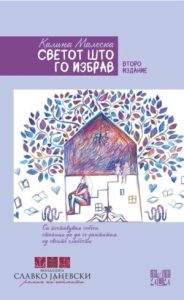 Kalina Maleska
Kalina Maleska
Kalina Maleska is a Macedonian writer and professor and literary translator.
Her works include: the novels Bruno and the Colors (2006), Apparitions with Silver Threads (2014), and The World I Chose (2024); the short story collections: Misunderstandings (1998), The Naming the Insect (2008), Itar Peyo, My Enemy (2016) and Skopje in the High Zone (2021); the play An Event among Many: Hypatia of Alexandria (2010); the children's books Arno ama (2018) and The Alien Lu-Ru-Su (2021).
Her novel The World I Chose received the Novel of the Year Award for 2024, awarded by the Foundation for the Promotion of Cultural Values “Slavko Janevski”.
Her short stories have been translated into several languages and published in magazines in the country and abroad, and she has participated in several Macedonian and international literary festivals. Her short story "A Different Kind of Weapon" is included in the anthology Best European Fiction 2018 She is also the winner of several literary residencies.
She works as a professor of English literature at the Faculty of Philology "Blaže Koneski" at UKIM in Skopje. She received her doctorate in 2012 with a thesis on the phenomenon of power. The focus of her literary research is utopian literature, postcolonial literature, contemporary literature and its connection with socio-political developments.
Regarding translating books from English to Macedonian, Maleska has translated a dozen literary works by authors such as Laurence Sterne, Mark Twain, Junichiro Tanizaki, Ambrose Bierce, L. Frank Baum, Katerina Babkina, Claire Keegan, and Lea Ypi.
.
 The World I Chose
The World I Chose
„Ili-ili“, Skopje, 2024
“NOVEL OF THE YEAR” award, 2024
The novel The World I Chose is a story about the transformation of Leona, whose sense of self and identity changes and develops through her encounter with various people and spaces: the basement in which she moves after a her divorce, the residents of the basement and the house above, the members of the education board, the office in which their meetings take place. The internal monologues in which Leona analyzes herself and the people around her with psychological depth and precision, often recalling the past, are interwoven with the ongoing episodes taking place at the board meetings. The dominant characteristic of the novel is its heterogeneity: the presence of various generations, classes, gender tensions, children with atypical cognitive development, excellently conveyed characters, ethical dimensions, empathy towards people, but also criticism.
